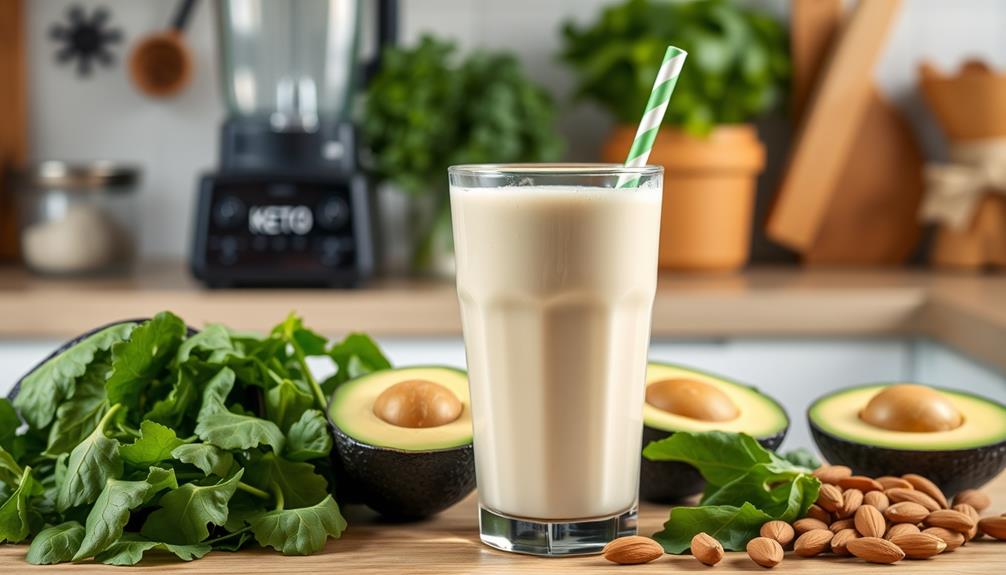To lower ketones on a keto diet, start by increasing your carbohydrate intake to 25-30% of your daily calories. Focus on complex carbs like whole grains and vegetables. Stay well-hydrated, aiming for about 240 mL of water every 30–60 minutes, especially during intense activities. Monitor meal timing; eat smaller meals every 3-4 hours to stabilize blood sugar. If you're diabetic, verify you're using adequate insulin to manage levels. These adjustments can help keep your ketone levels in check. There's more to optimizing your keto journey, so keep exploring the best strategies for your health.
Key Takeaways
- Increase carbohydrate intake to 25%-30% of daily calories, focusing on complex carbs like whole grains, fruits, and vegetables.
- Stay well-hydrated by drinking water regularly and increasing sodium intake to counteract diuretic effects.
- Maintain consistent meal timing with smaller meals every 3-4 hours to stabilize blood sugar levels.
- Engage in regular aerobic and resistance exercises to promote glucose utilization and improve insulin sensitivity.
- Monitor ketone and blood glucose levels regularly to prevent diabetic ketoacidosis and adjust dietary intake accordingly.
Understanding Ketones

Ketones play an essential role in the ketogenic diet, serving as an alternative energy source when your body runs low on carbohydrates. When you consume fewer carbs, your liver breaks down fat, producing ketones. This process leads you into a state known as ketosis, where your body can effectively use ketones for energy.
Understanding common financial terms can help you manage your budget while on the diet. Nutritional ketosis is typically marked by blood ketone levels between 0.5 and 3.0 mmol/L, which is generally safe and can be beneficial for weight loss.
However, you need to monitor your carbohydrate intake closely. If your ketone levels rise too high—above 3.0 mmol/L—you could be at risk for diabetic ketoacidosis (DKA), especially if you have diabetes. DKA is a dangerous condition that requires immediate attention.
To maintain ideal ketone levels while following the keto diet, regular testing of your ketone levels is essential. You can use blood, urine, or breath tests to keep track.
Factors Influencing Ketone Levels

Several factors can greatly impact your ketone levels while on the ketogenic diet. One of the most important is your carbohydrate intake; consuming less than 50 grams of total carbs daily is typically required to maintain nutritional ketosis and effectively lower ketone levels.
If you find your ketones exceeding safe thresholds, consider adjusting your dietary approach to include more carbs, aiming for 25%-30% of your daily caloric intake. Additionally, staying well-hydrated can help flush excess ketones from your body, similar to how cold medications can affect hydration during illness.
Insulin levels also play a significant role in ketone production. Inadequate insulin can lead to increased ketone production, so if you're diabetic, make sure to administer enough rapid-acting insulin to manage your levels effectively.
Hydration is another essential factor; drinking plenty of water helps flush excess ketones from your body.
Moreover, lifestyle factors such as stress, illness, and hormonal changes can elevate ketone production. It's important to monitor these influences and adjust your diet and insulin administration accordingly to mitigate their effects.
Being aware of these factors will help you maintain better control over your ketone levels while enjoying the benefits of the ketogenic diet.
Dietary Adjustments to Lower Ketones

To lower your ketone levels, you'll want to increase your carbohydrate intake and stay hydrated regularly.
Incorporating foods rich in antioxidants, like celery juice, can also support your overall health and assist in managing your body's metabolic processes.
Monitoring your meal timing can also play an essential role in managing ketone production.
Increase Carbohydrate Intake
If you're looking to lower your ketone levels on a keto diet, increasing your carbohydrate intake is a practical approach. Aim for carbohydrates to make up 25%-30% of your daily calories, gradually adjusting to 45%-60% as needed. This strategy guarantees an adequate supply of glucose for energy and helps mitigate elevated ketones. The recommended daily carbohydrate intake for adults is 130 grams, but you can tailor this based on your activity level.
Incorporating complex carbohydrates such as whole grains, fruits, and vegetables can provide essential nutrients while effectively lowering ketone levels. Pairing carbohydrates with protein and fat can help you maintain balanced meals, preventing extreme fluctuations in ketone production.
It's essential to monitor blood ketone levels after making dietary changes to assess their effectiveness and guarantee you're maintaining safe levels.
| Food Source | Carbohydrate Content (grams) | Benefits |
|---|---|---|
| Quinoa | 39 | High in protein and fiber |
| Sweet Potatoes | 26 | Rich in vitamins and minerals |
| Brown Rice | 45 | Provides sustained energy |
| Lentils | 40 | Great source of protein |
| Oats | 27 | Helps with digestion |
Stay Hydrated Regularly
Staying hydrated regularly plays an essential role in managing elevated ketone levels on a keto diet. Proper hydration helps flush excess ketones from your body, reducing the risk of high ketone levels.
Additionally, being aware of financial considerations for elderly care can help you manage your overall health budget while adhering to your dietary goals. Aim to drink about 8 fl oz (240 mL) of water every 30 to 60 minutes to maintain ideal hydration. If your blood sugar exceeds 250 mg/dL, reach for sugar-free drinks to stay hydrated while lowering ketone levels.
To guarantee effective hydration and electrolyte balance, consider these tips:
- Increase your sodium intake to 4000-5000 mg/day to counteract the diuretic effect of a keto diet.
- Monitor your fluid intake, especially during illness or high physical activity, as these can lead to dehydration and increased ketone production.
- Pay attention to symptoms of dehydration, like dry mouth and excessive thirst, which signal that you need more fluids.
Monitor Meal Timing
Monitoring your meal timing is vital for effectively managing ketone levels on a keto diet. By consuming meals and snacks consistently throughout the day, you can help maintain stable blood sugar and insulin levels, reducing the likelihood of excessive ketone production.
Incorporating essential oils for respiratory health can also support overall wellness during this dietary shift. Aim to eat smaller, more frequent meals every 3-4 hours to prevent spikes in ketone levels. This approach guarantees a steady supply of glucose for energy, particularly important when following a low-carb diet.
Incorporating a balanced mix of macronutrients—moderate carbohydrates, protein, and healthy fats—during each meal supports stable ketosis without excessive ketone buildup. By focusing on balanced meals, you can better regulate your energy needs while minimizing the risk of prolonged fasting, which can lead to increased ketone levels.
Additionally, it's vital to monitor your meal timing and adjust your carbohydrate intake based on your activity levels. This strategy can further assist in managing ketone levels, making sure you meet your energy needs without entering a state of ketosis that produces excessively high ketone levels.
Importance of Hydration

Staying hydrated is key to managing your ketone levels effectively. Adequate hydration supports kidney health and helps flush out excess ketones from your system, which is essential for maintaining balance on a keto diet.
Aim to drink 8 fl oz of water every 30 to 60 minutes to help flush out excess ketones and avoid dehydration, which can worsen your condition. By monitoring your hydration, especially during workouts or illness, you can better control your ketone production and overall health.
Additionally, incorporating a balanced diet rich in fruits and vegetables can further support your hydration efforts.
Hydration Frequency Recommendations
When you're following a ketogenic diet, keeping hydrated is essential for managing your ketone levels effectively. Aiming for consistent fluid intake is vital, especially if you experience high ketone levels.
It's recommended to drink 8 fl oz (240 mL) of water every 30 to 60 minutes to help flush excess ketones from your body. This regular hydration not only supports kidney function but also promotes overall metabolic health.
Additionally, ensuring proper hydration can improve overall health, similar to how maintaining clean air quality with an air purifier maintenance guide can enhance your living environment.
- If blood sugar levels exceed 250 mg/dL, opt for sugar-free drinks to maintain hydration.
- When blood sugar is below that threshold, sugary drinks can help manage hydration and energy levels.
- Increasing your water consumption can alleviate symptoms of the "keto flu," such as headaches and fatigue.
Effects of Dehydration
Dehydration can wreak havoc on your body, especially when you're on a ketogenic diet. When your fluid intake is low, it hampers your kidneys' ability to flush out excess ketones effectively, leading to high levels in your system.
Additionally, incorporating gentle stretching before bedtime can help relax your muscles, potentially alleviating discomfort associated with dehydration. You might experience symptoms like dry mouth and fatigue that could easily be mistaken for rising ketone levels.
To combat dehydration, aim to hydrate consistently, consuming approximately 8 fl oz (240 mL) of water every 30 to 60 minutes. This isn't just about quenching thirst; it's essential for maintaining energy levels and balancing electrolytes, particularly sodium and potassium.
Yoga for back pain can also be beneficial, as these electrolytes can easily get disrupted on a ketogenic diet, potentially contributing to the dreaded "keto flu" if not managed properly.
Role of Insulin in Ketone Management

Insulin is a key player in managing ketone levels during a ketogenic diet. It promotes glucose utilization over fat metabolism, which reduces ketone production in the liver.
Understanding the risks associated with high ketone levels is essential, particularly for those with diabetes, as they might experience complications during fluctuations. When you administer rapid-acting insulin, it helps lower elevated ketone levels by facilitating glucose uptake into cells, preventing the need for fat breakdown.
Insufficient insulin can lead to increased fat oxidation, resulting in heightened ketone production and potentially ketoacidosis, especially for those with diabetes.
To manage your ketone levels effectively, consider the following:
- Regular monitoring: Keep an eye on your blood glucose levels, especially when they exceed 240 mg/dL.
- Adjust insulin doses: Tailor your insulin intake to your carbohydrate intake and overall dietary needs.
- Consistent meal timing: This helps maintain stable insulin levels, aiding in effective ketone management.
Additionally, staying informed about high volatility risks in cryptocurrency markets can enhance your overall understanding of metabolic fluctuations.
Exercise and Lifestyle Changes

Managing your ketone levels isn't just about monitoring insulin; exercise and lifestyle changes play significant roles too. Engaging in regular aerobic exercise, like brisk walking or cycling, promotes glucose utilization for energy, which reduces your reliance on fat as a fuel source. This shift can help lower ketone production in your body.
Additionally, incorporating energy-saving features in your routine, such as optimizing your home environment for comfort, can enhance your overall well-being, allowing you to focus more effectively on your health goals. smart technology integration can also support your efforts by providing insights into your daily habits.
Incorporating resistance training into your weekly routine boosts insulin sensitivity, enabling better glucose uptake. This can further decrease ketone production while enhancing your metabolic activity.
Don't underestimate light physical activities—simple tasks like household chores or short walks keep your metabolism active without triggering excessive fat metabolism.
Maintaining regular meal timing and frequency is vital. This helps stabilize blood sugar levels and provides your body with consistent energy sources, minimizing ketone production.
Monitoring Ketone Levels
To effectively manage your ketone levels, regular monitoring is vital. Using a blood ketone meter provides the most accurate readings, allowing you to aim for nutritional ketosis levels between 0.5 and 3.0 mmol/L.
It's best to test your ketones approximately three hours after meals to account for fluctuations based on your dietary intake.
While urine test strips can serve as an alternative for measuring ketones, keep in mind that dehydration can lead to inaccurate results. Additionally, consider breath tests that measure acetone to gauge your ketosis, but be aware of their varying reliability and cost.
It's important to monitor both blood sugar and ketone levels closely, especially if your blood glucose exceeds 240 mg/dL. This vigilance helps prevent the risk of diabetic ketoacidosis, a serious condition that can occur when insulin levels are inadequate.
Here are some tips for effective monitoring:
- Use a blood ketone meter for accuracy.
- Test regularly and at consistent times.
- Stay hydrated to guarantee accurate urine test readings.
Frequently Asked Questions
How Can I Lower My Ketones Quickly?
To lower your ketones quickly, increase your carbohydrate intake, stay hydrated, and avoid intense exercise. Consider light activities instead, and if necessary, consult with a healthcare professional about managing your levels effectively.
What to Do if Ketones Are Too High on a Keto Diet?
If your ketones are too high, increase your carb intake temporarily, stay hydrated, and monitor your levels. If they remain elevated, consider consulting a healthcare provider for tailored advice and potential interventions.
How to Flush Ketones Out of Your System?
To flush ketones out of your system, drink plenty of water, increase your carb intake temporarily, avoid intense exercise, and monitor your ketone levels to make necessary adjustments for better management.
What Foods to Avoid if You Have High Ketones?
If you have high ketones, avoid high-carbohydrate foods like bread and pasta, excessive protein sources, processed snacks with trans fats, and starchy vegetables. Steer clear of alcohol to help manage your ketone levels effectively.
Conclusion
To lower your ketone levels on the keto diet, focus on dietary adjustments, stay hydrated, and maintain a balanced lifestyle. Did you know that studies show over 60% of people on a strict keto diet experience elevated ketones, which can lead to unwanted side effects? By making mindful changes and monitoring your levels, you can enjoy the benefits of ketosis without the drawbacks. Remember, it's all about finding the right balance for your body!









